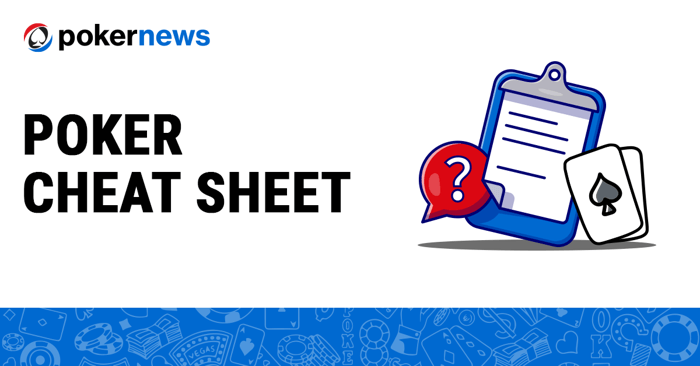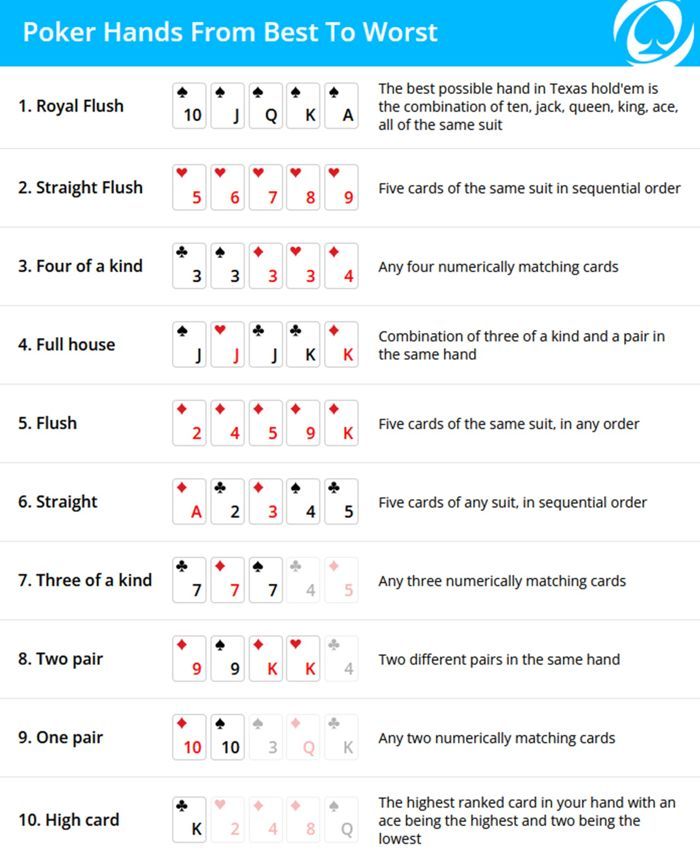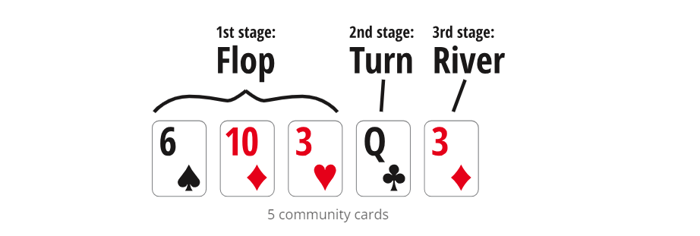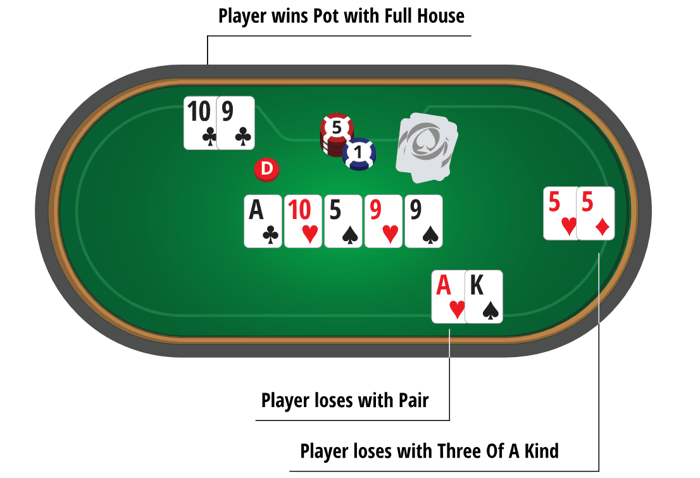Ulitmate Texas Hold'em Poker Cheat Sheet (FREE Download)

Are you looking to get a head start on your opponents at the poker tables? You have come to the right place because PokerNews is on hand with a free ultimate poker cheat sheet for Texas Hold'em.
Full List of All Poker Hand Rankings

Texas Hold'em Betting Rounds Explained
Every Texas Hold'em cash games and tournament features four betting rounds: preflop, the flop, the turn, and the river.

Preflop – What is Preflop in Texas Hold'em and How Does it Work?
Preflop is where every Texas Hold'em hand begins. The player to the immediate left of the dealer pays a small blind, and the player to their direct left pays a big blind, which is usually twice the size of the small blind. If antes are in play, each player pays their ante during the preflop round.
Once the blinds are paid, and any antes if they are in play, the dealer pitches a face-down card to each player, starting with the small blind and moving in a clockwise direction. The dealer then deals another face-down card to each player starting with the small blind.
Once everyone has their "hole cards," the player to the immediate left of the big blind, a position known as under the gun, acts first. They have the option to fold, call a bet the same size of the big blind (known as limping), or raise. If the under the gun player folds or calls the next player has the same three options. If the under the gun player raises, the next player to act can either match their raise with a call or make a raise of their own.
This continues until everyone at the table has acted. The game proceeds to the flop if two or more players still have hole cards in front of them.
The Flop – What is the Flop in Texas Hold'em and How Does it Work?
The flop in Texas Hold'em games usually defines how the hand progresses because it reveals three of the five community cards. This betting round starts with the player closest to the dealer's left; that player can check or bet. The next player can either fold, call the bet, or put in a raise.
The flop betting round ends and a new hand begins if only one player remains in the hand. The game progresses to the turn if two or more players stay in the hand.
The Turn – What is the Turn in Texas Hold'em and How Does It Work
The Turn, sometimes called fourth street, is when the fourth of five community cards is revealed.
The action follows the same rules as the flop. The turn betting round ends and a new hand is dealt if only one player remains after everyone has acted, or move onto the river if two or more players still have hole cards in front of them.
The River – What is the River in Texas Hold'em and How Does it Work?
The river is when the fifth and final community card comes into play in a Texas Hold'em cash game and tournament. Again, this betting round starts with the player closest to the dealer's left. The first player can check or bet, with subsequent players able to fold, call the bet or raise. Once the betting round is completed, a the game ends and a new one begins if only one player has cards in front of them, or moves onto the showdown if two or more players remain in the hand.
Showdown – What is the Showdown in Texas Hold'em and How Does it Work?

A showdown occurs if two or more players remain in the hand once the river betting round is complete. The player that last showed aggression, that is bet or raised, reveals their hole cards. If there was no betting action (i.e. the river was checked around), the player closest to the dealer's left reveals their holding first.
The winner of the hand is the player with the best five card poker hand ranking. The other players do not need to show their hole cards if they cannot beat the hand shown to them by the other player. "Mucking" is folding your hand without it being seen by your opponents.
Here's everything you need to host your own poker game!
| Poker Product | Necessity | Our Choice On Amazon |
|---|---|---|
| Poker Chip Set | Must Have A♦ | Buy Now |
| 2 x Proper Playing Cards | Must Have A♠ | Buy Now |
| Poker Table Felt | Must Have A♣ | Buy Now |
| Pro Poker Table | Nice to have K♥ | Buy Now |
| Funny Sunglasses | Just for Fun Q♦ | Buy Now |
| Poker Whiskey Glasses | Just for Fun Q♠ | Buy Now |
| I don't fold T-shirt | Just for Fun Q♣ | Buy Now |
| Poker Rap Star Chain | For Ballers J♥ | Buy Now |
Positions in Poker Explained
Each position at the poker table has a name when you are playing Texas Hold'em. Those names are as follows at a nine handed table:
UTG – An acronym for Under The Gun. It is the player seated to the direct left of the big blind. It is called such because the player is first to act preflop.
Early position – The next two players after the UTG are referred to as being in early position.
Middle position – The next two seats after early position are called middle position
Cutoff – This is the player to the immediate right of the dealer or button
Dealer of Button – This is the player acting as the dealer; they act last every hand. The dealer button moves clockwise at the start of each new hand.
Small Blind – The small blind is seated directly to the left of the dealer. They pay the small blind before the preflop betting round.
Big Blind – The big blind sits to the direct left of the small blind. They pay the big blind before the preflop betting round of each hand.
WATCH! How to play Texas Hold'em Poker
How to Play Each Position in Poker
Once you learn position in poker, you realise your strategy alters depending on where you are seated at the table in relation to the dealer. As a general rule, the more player that are left to act after you, the tighter you should play.
How to Play UTG in Poker
You should play a very tight range of hands when playing from UTG at a full-ring or nine-handed table. This is because there are several opponents left to act who could raise you. Even if they only call, they will act after you so have more information about the hand on which to base their decisions.
How to Play in Early Position in Poker
You should still play tight in early position but you can start adding more starting hands to your arsenal. If the players left to act are playing tight, you can add even more starting hands to your repertoire. Tighten up if those left to act are raising and re-raising frequently.
If the UTG has raised, you usually need a very strong hand to continue in the hand.
How to Play in Middle Position in Poker
Being in middle position allows you a little more freedom when you are first to act because almost half of the table has already folded, and there are not as many players left to act. Hands such as small pairs and suited connectors start being added to your range of starting hands.
How to Play the Cutoff in Poker
The cutoff is a powerful position because only the button and blinds are left to act, and the blinds will be out of position against you if they choose to call a raise. The cutoff is prime position for opening pots with a raise with a wide range of hands, unless the button and blinds have shown a tendency for three-betting (re-raising) raises from late position.
You will often win the pot uncontested, but will have position on all but the button if your bet is called.
How to Play the Button in Poker
The button is another name for the dealer because you have a dealer button placed in front of you. Most of your winnings will stem from being on the button; the position is that powerful. Open pots with a raise with a wide range of hands because you only have the blinds to beat and will have position on them for the rest of the hand if they do call your raise.
You can also call earlier position raises with a wider range of hands if you are on the button because you have more information about the hand before you act, plus the all-important positional advantage.
How to Play the Small and Big Blind in Poker
You will lose money playing from the blinds no matter how good you are at poker. The positional disadvantage is too great for even the very best to play profitably. The blinds are not a place to be splashing around in pots. Instead, stick to premium hands and hands that could flop sets, or draws.
Poker Terms Explained
There are thousands of poker terms, but you do not need to learn them all! Here are a handful of the most common poker terms you will hear in Texas Hold'em.
- Action – A check, call, fold, or raise is called an action. Action sometimes refers to a game where there is a lot of betting and raising i.e. an action game.
- Ante – An ante is a forced bet made preflop in addition to the blinds. Sometimes, everyone pays an ante, other times the player UTG+1 or the button pay an ante, often called a straddle in this case.
- All-In – A player is all-in whenever they have committed all of their chips into the pot during a hand.
- Big Blind – The player seated two seats to the left of the dealer and one to the left of the small blind. The big blind is also the forced preflop bet.
- Check – Checking is when you do not want to bet or raise but do not want to fold.
- Community Cards – These are the five cards placed on the table which you use, alongside your hole cards, to make the best five card poker hand.
- Draw – A draw is when you have an unmade hand but could improve to a straight or flush on future streets. For example, you hold A♦K♦ and the flop falls 4♦5♦9♠, you have a diamond flush draw.
- Fold – Folding is throwing away your hand with it's your turn to act.
- Gutshot – A gutshot or inside straight draw. An example would be holding 8x7x on a Kx5x4x flop. Here you need only a 6x to complete your straight.
- Heads-Up – Heads-up is used to describe any hand where only two players are contesting the pot.
- Hole cards – These are the cards the dealer pitched to you preflop. They are called such because they remain face down until showdown, so it is like they are in a hole.
- Kicker – The highest unpaired side card in a players hand. Kickers come into play when making the best five card poker hand. For example, you hold A♠Q♥ and your opponent A♦J♣ on a 4♣9♦A♥2♥8♣ board. You and your opponent have a pair of aces, but your queen-kicker wins you the pot.
- Muck – The muck is the pile of discarded and unused cards in a Texas Hold'em game. To muck is to discard or throw your hand away, usually without revealing its value.
- Nuts – the nuts is the strongest possible hand that cannot be beaten by any other possible hand. While a royal flush is the ultimate example of the nuts, you can have the nuts with an ace-high straight or flush, or even with top set.
- Overcard – An overcard is a card that is higher than any of the community cards. If you held K♣Q♣ on a 5♦6♠8♣ flop, you would have two overcards to the flop.
- Tilt – A term used to describe when a player's emotions have taken over them, and they begin to play sub-opitmally.
Tips and Strategy to Help You Win at Poker
Top 5 Poker Tips for Cash Games
- Realise the power of position – play tight in early positions and loosen up as you move closer to the button.
- Try not to limp into pots – This is particularly true in short-handed games. They say if a hand is worth opening the betting with, it is worth doing so with a raise.
- Blind Play – Play tight when you are seated in the blinds because you are all but guaranteed to lose money in the long term in these positions.
- Attack the blinds – Even if your hole cards are weak, it is often worthwhile attacking the blinds from the cutoff and button if everyone else has folded.
- Pay attention – Take notes on the two player to your immediate left and the two to your right because they will be in the blinds when you have the button, and you will be in the blind when those on the right have stealing opportunities.
LEVEL UP YOUR CASH GAME SKILL SET
Top 5 poker Tips for Tournaments
- Play tightly early on – Hardly anyone wins a poker tournament in the first few levels of play. Try to play tightly as the tournament begins.
- Conserve your stack – Preserving your stack is often more important that building a bigger stack, particularly early into the tournament.
- Similarities to cash games – Remember that tournaments are similar to cash game in that the positions etc are the same. Don't start going crazy from UTG just because it is a tournament.
- Be aggressive on the bubble – You can accumulate many chips as the money bubble approaches because many players are looking to fold their way into the money. Take advantage of these players.
- Keep an eye on the stack sizes – Stack sizes vary wildly in tournaments, but often remain similar in cash games. Be aware of the stack sizes of the players yet to act because you could be priced in to call their all-in bet
Top 5 Poker Tips for Heads Up
- Know your foe – Observation is everything in heads-up poker. Take notes on all of your opponents' tendancies.
- Position is key – The power of position is amplified during heads-up play. Be ultra-aggressive when you have the button.
- Aggression is crucial – Heads-up is often a battle of wits and a who dares wins affair. Bet and raise strong and made hands, and even bet your draws.
- Don't Get bullied – Your heads-up opponent is likely playing aggressively, so you need to play back at them to show you cannot be pushed over.
- Preflop raises can be smaller – It is OK to raise less preflop when you have the button because you only have one opponent to beat. Furthermore, it helps limit your losses if you are facing an aggressive opponent that frequently three-bets.
Top 5 Poker Tips for Bounty Builder Tournaments
- Apply pressure – Use the fact you can bust an opponent to your advantage. Be the big stack bully.
- Do not blindly chase bounties – Although some bounties grow substantial and their value, to some degree, governs if you can call an all-in bet profitably, do not blindly chase bounties.
- Avoid risking your stack early – The bounties are small at the start of a Bounty Builder tournament, and are not worth risking busting from the event.
- Be prepared to see some craziness – Players will move all-in and call all-in bets with some weird and wonderful hands once the bounty payments increase. Prepare to not believe your eyes!
- Solid poker is still best – Think of the bounties as added bonuses. The biggest prizes are reserved for the top three main prize pool payouts, so aim to reach here.
WIN MORE IN BOUNTY TOURNAMENTS
Top 5 Poker Bankroll Management Tips to Help Build a Bankroll
- Track your play – Keep a record of your profits and losses when trying to build a bankroll. It is important to track where your bankroll stands at all times.
- Slow and steady – Building a bankroll can take time unless you manage to win a tournament for a large score. Slow and steady wins the race when it comes to building a poker bankroll.
- Take advantage of bonuses – Welcome bonuses and promotions can give your bankroll a shot in the arm. Check out PokerNews' online poker reviews for the best online poker bonuses.
- Treat your bankroll like an investment – Treat your poker playing like a business so that you value every decision. Pretend you cannot reload your account, and see if you can nurture your bankroll to dizzy heights.
- Game select carefully – There is no point being the sixth best poker player on the planet if you continually play against the top five players. Choose your games and tables wisely. If there isn't a fish or two in your game, swap tables.
LEARN MORE ABOUT BANKROLL MANAGEMENT
Helpful Links on How to Get Better at Poker
- How to Play Texas Hold’Em
- 7 Tips to Take Your Game from ‘Meh’ to ‘Amazing’
- 10 Hold’Em Tips (Dos and Don’ts)
- Poker Starting Hands Chart
- Poker Terms Dictionary
Poker Cheat Sheet FAQs
What is a Poker Cheat Sheet?
A poker cheat sheet is a set of guidelines or tips that players can use to remember important things about playing poker, such as poker strategies, hand rankings, odds, and other critical aspects of the game. It's usually a physical or digital document that provides quick, at-a-glance advice, such as the Texas Holdem Poker Cheat Sheet PDF that can be found on this page.
Why use a Poker Cheat Sheet?
A poker cheat sheet can be utilized by players with different levels of skills and experience. For beginners, it helps in learning the game faster by providing a quick reference to complex aspects like hand rankings and betting strategies. Once the basics have been mastered, it can assist in refining strategies and decision-making processes, especially in unfamiliar or challenging situations.
Are Poker Cheat Sheets legal?
Most casinos and formal poker tournaments do not allow the use of cheat sheets, as they can be seen as a tool for gaining an unfair advantage, and online platforms typically don't allow them, either, so please ensure you aren't breaking any rules if you do choose to download our Texas Holdem Poker Cheat Sheet PDF. In casual home games, however, cheat sheets are often allowed and seen as a learning tool, but make sure you check with the host and the other players at the table.
Can using a Cheat Sheet improve my game?
Yes, a Poker Cheat Sheet can improve your poker play, especially for beginners and intermediate players. It helps you to learn the game faster, make more informed decisions and develop a more structured approach to poker.
